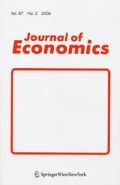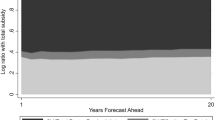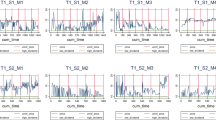Abstract
The current paper develops the microeconomic case for a Tobin tax. It combines the noise-trader literature with the Tobin-tax-policy literature. Noise traders cause economic losses by inappropriately cashing out their investments. A Tobin tax can reduce such activity, thereby conferring a benefit on fundamentals investors. The paper identifies the conditions under which these gains would be largest and provides guidelines as to whether a tax is warranted. There is a trade-off because Tobin taxes discourage fundamentals investors from trading, and there are occasions when they would rationally choose to trade but do not because of the tax.
Similar content being viewed by others
References
Baker, D., Pollin, R., and Schauberg, M. (1995): “The Case for a Securities Transactions Tax: Taxing the Big Casino.” Working paper, Economic Policy Institute, Washington, DC.
De Long, J. B., Shleifer, A., Summers, L. H., and Waldman, R. J. (1990): “Noise Trader Risk in Financial Markets.”Journal of Political Economy 98: 703–738.
Felix, D., and Sau, R. (1996): “On the Revenue Potential and Phasing In of the Tobin Tax.” InThe Tobin Tax: Coping with Financial Volatility, edited by M. Haq, I. Kaul, and I. Grundberg. Oxford: Oxford University Press.
Friedman, M. (1953a): “The Methodology of Positive Economics.” InEssays in Positive Economics. Chicago: Chicago University Press.
— (1953b): “The Case for Flexible Exchange Rates.” InEssays in Positive Economics. Chicago: Chicago University Press.
Keynes, J. M. (1936):The General Theory of Employment, Interest and Money. London: Macmillan.
Palley, T. I. (1997): “Managerial Turnover and the Theory of Short-Termism.”Journal of Economic Behavior and Organization 32: 547–557.
— (1999): “International Finance and Global Deflation: There Is an Alternative.” InGlobal Instability and World Economic Governance, edited by J. Grieve-Smith and J. Michie. Cambridge: Cambridge University Press (forthcoming).
Stein, J. C. (1989): “Efficient Capital Markets, Inefficient Firms, in a Model of Myopic Corporate Behavior.”Quarterly Journal of Economics 104: 655–669.
Tobin, J. (1978): “A Proposal for International Monetary Reform.”Eastern Economic Journal 4: 153–159.
Tornell, A. (1990): “Real vs. Financial Investment: Can Tobin Taxes Eliminate the Irreversibility Distortion?”Journal of Development Economics 32: 419–444.
Author information
Authors and Affiliations
Rights and permissions
About this article
Cite this article
Palley, T.I. Speculation and Tobin taxes: Why sand in the wheels can increase economic efficiency. Zeitschr. f. National#x00F6;konomie 69, 113–126 (1999). https://doi.org/10.1007/BF01232416
Received:
Revised:
Issue Date:
DOI: https://doi.org/10.1007/BF01232416




